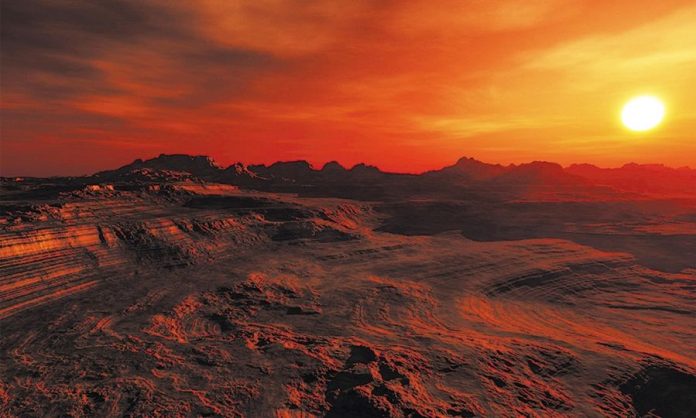
Thoughts on the prospect of colonizing the Red Planet, which seems to be becoming more and more feasible
Close your eyes and let your imagination run wild. It is “a summer dusk on the calm temperate planet Mars”, as described by Ray Bradbury in 1950 in his luminous novel “The Chronicles of Mars” (published by Agra, translated by Dimitris Arvanitis, reprint 2021). “Boats slender like bronze flowers were slowly being carried to the canals of green wine. In the long and endless houses that stretched out on the hills like sleeping snakes, lovers whispered lazily lying on cool beds. Young children ran through the streets lit by torches, holding golden spiders weaving thin webs. Here and there, a late dinner at tables where the silver lava was simmering. In the amphitheaters of hundreds of cities on the night side of Mars, the bronze Martians with their golden round eyes gathered lazily, concentrating their attention on the scenes, where the musicians played a serene music that poured like the scent of flowers in the silent air. A woman was singing in a scene. The audience shook. “
Reading Bradbury today – the images and situations that his imagination carved on the barren and harsh landscape of the Red Planet – one realizes that what until yesterday was a mental experiment of artists, today is a viable perspective. In recent months alone, we have seen an American helicopter fly to Mars, Perseverance produce oxygen there, and the Chinese Space Agency land a vehicle on its surface. News informs us about the possibility that we have already contaminated Mars with germs, through the unmanned vessels that we have sent.
At the same time, we are witnessing the competition of technology billionaires, who are competing for who will get there first. Space, and especially Mars, is coming closer and closer to the forefront of humanity as a possible possibility, an inhospitable but accessible territory for the continuation of our species. Science sees the riddles of art as challenges, and attempts to tackle them in practice. With experiments that have material substance, and exploratory missions. The imaginary penetrates the real and produces new challenges. Where some saw only impossibilities, others now come and see colossal opportunities.
“I want Americans to emerge victorious in the job-creation discovery; I want to open up to the solar system not only to explore but also to inhabit it.” With these words of the former US President, Barack Obama, begins the small but comprehensive book with the title that leaves no room for misinterpretation, “How to live on Mars” (published by Key Books, translated by Erietta Vassiliou-Sgourou, 2021 ). Writer and journalist Stefan Petranek is literally. He believes that the colonization of Mars is a matter of time. He cites the “rocket man” Elon Musk, who has stated that by 2050 at the latest they will have covered the distance of 55 million kilometers, and several thousand people will have reached Mars. Of course, he has said that the first courageous people who will make the journey of six to nine months, should be “ready to die”. The first attempts of our species to walk on the planet will probably resemble the adventure directed by Andy Weir in his novel “Man on Mars” (published by Papadopoulos, translated by Costas Harvatis, 2014). In this fantasy screenplay made by Ridley Scott, starring Matt Damon, the astronaut explorer tries to tame the nature of the alien planet and survive against the laws of the universe, with technology alone as his ally. In a way it looks like a conquistador.

Petranek says that “despite the common features with the explorers of the past, the pioneering space explorers are in every way more important than all the previous ones. “Their presence on Mars represents the greatest achievement of the human intellect.” In the impressively demanding – in all respects – plan, which is gradually beginning to unfold, we see the triumph of science and technology. Ethical, social and political issues are unfortunately secondary. What matters is the inevitability of success, the overcoming of the invisible obstacles that matter poses to us.
“When the first humans landed on Mars, that moment will be the most important for technology, philosophy, history and exploration, because we will no longer be a species on a single planet.” , Petranek writes with some verbalism. Colonization is framed in various ways. We are an extremely ambitious species that is constantly looking for the new. We fear disaster, and we provide. Mars can become our “second home”, and we an “interplanetary species”. Futurist Mitsio Kaku assures that “the Earth is not a safe place. “The dinosaurs did not have a space program,” he says. We go to Mars to save the Earth, and why we have exploration in our DNA. We always want to expand the limits of our knowledge and understanding. Let's start taking the case more seriously, Petranek urges.
In Michael Barnett's documentary “The Generation of Mars” (Netflix, 2017) we see enthusiastic teenagers experimenting at a NASA space camp and talking about the journey to Mars with the certainty that one day they will experience it. The children who are in primary school today, maybe one day, when they are adults, do not have to close their eyes, like skyscrapers, in order to imagine the Red Planet. Maybe instead they should have them wide open.
On the other hand, there is of course reasonable criticism. “The ideology of these space spectacles is deeply connected to the ideology of the artificial intelligence industry,” writes Kate Crawford in her book Atlas of AI (Yale University Press, 2021). “The extreme wealth and power generated by technology companies now allows a small group of men to expand into their own private race. They rely on the exploitation of the knowledge and infrastructure of twentieth-century public space programs, and very often depend on government funding and tax incentives. Their goal is not to be limited to mining and development but to extend throughout the solar system. “In fact, these efforts are more about the fantasy of space, endless growth, and immortality, despite the uncertain and unpleasant prospects of true space colonization.” For now, and while the time of a “summer dusk on the calm temperate planet Mars” is still far away, let us consider how we now deal with our own summer dusk, on the troubled and tormented planet called Earth.
source: KAPHIMERINI KYPROU




